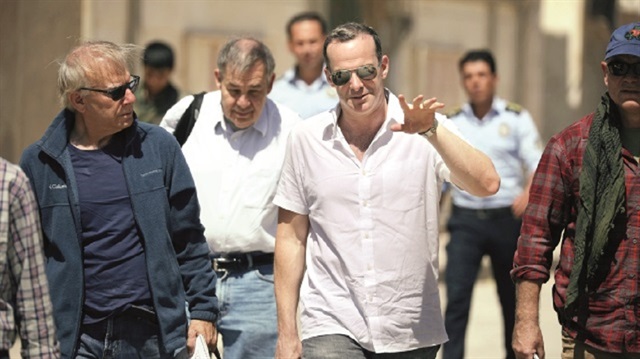
The U.S. has long tried to sabotage Turkey’s efforts through critical visits, statements and diplomatic manoeuvers, which was once more put into play before the launch of the Afrin operation
Throughout the Syrian crisis the U.S. has interfered with every step taken by Turkey, working in to buy time for terrorist organizations, such as the Kurdistan Workers’ Party (PKK) and Daesh, through means of diversion and provocation against Turkey, which was once more put into play before the launch of the Afrin operation.
The U.S. has long tried to sabotage Turkey’s efforts through critical visits, statements and diplomatic manoeuvers, the last of which is a visit by U.S. Special Daesh Representative Brett McGurk.
In Jan, 2016, McGurk became the first senior official to visit PKK terrorists’ Syrian military base in Ayn al-Arab (Kobani). During that period, the U.S.’s then deputy Secretary of State Tony Bilinken had held telephone meetings with the PKK’s Syrian ringleader Salih Muslim. However, McGurk was not alone in his 2016 visit, he was joined on that flight by English and French diplomats in an attempt to provide international legitimacy to PKK terrorists.
Nor did the U.S. keep promises made to Turkey during diplomatic meetings regarding the withdrawal of PKK terrorists from the northern Syrian city of Manbij, after Daesh’s defeat, and setting up a council comprised of Manbij residents to manage the city’s administrative duties.
Despite making these promises, the U.S. handed control of the city over to PKK terrorists, who were preparing to launch an operation to seize Jarabulus.
After the PKK reached the town of Ayn al-Bayda, it became clear these promises were mere diversions and Turkey proceeded to launch the Euphrates Shield Operation.
The U.S. perpetrated another lie in order to buy time and protect PKK terrorists in Manbij, at the moment the Euphrates Shield Operation was nearing the city, claiming that PKK terrorists will be withdrawn to the east of the Euphrates. This turned out to be another manoeuver as the PKK shed its YPG skin and put on Syrian Democratic Forces (SDF) uniforms.
The U.S. had always denied it was supplying arms to the PYD/PKK despite providing uniforms and ammunition, in addition to theoretical and practical training to hundreds of PKK terrorists in military bases set up in the northeastern cities of Hasakah and Ayn al-Arab.
Instead they claimed its weapons were going to the SDF, which is a front that is being run by PKK terrorists.
Turkey has opposed the PKK taking part in the operation against Daesh in Raqqa, its Syrian stronghold, backing the Free Syrian Army (FSA) and the region’s tribes’ participation instead. Despite the U.S.’s initial agreement with Turkey’s perspective, the U.S worked behind the scenes to prepare an operation that included PKK terrorists.
The Raqqa operation turned into a massacre with thousands of civilians losing their lives as a result of the U.S.’s military backing of PKK terrorists.
The U.S. has publically backed a political solution to the Syrian crisis during international conferences for a lengthy period of time, despite doing everything possible, behind the scenes, to sabotage any political process.
The American administration spared no effort to try to include the terrorist PKK’s Syrian affiliated ringleader Salih Muslim in the Geneva talks, resulting in a diplomatic war with Turkey, which angered Turkey by being asked to sit on a negotiating table with terrorist organizations. Thus the Geneva talks turned into a stalemate.
In the context of the Mosul operation, Turkey sent military reinforcements to the Bashika Camp in northern Iraq to train the region’s local forces, after coordinating with President Massoud Barazani, infuriating the U.S.
The U.S. opposed the move and McGurk reiterated the stance which stipulated that any military action must be conducted after receiving the approval of Iraq’s central government.
After sabotaging the operation, the U.S.-backed Mosul campaign stalled for 10 months before clearing Daesh from the northern Iraq city, which was flattened during rounds of fierce conflict and saw its historical landmarks destroyed.
The operation, was spearheaded by the sectarian Hashd al-Shaabi militias, and it was reported that its fighters carried out massacres and torture against civilians.
U.S. Central Command Forces official Joseph Votel tried to dissuade Turkey from launching an anti-Daesh operation, after it sent surveillance forces across the border to mark the terror groups’ territories in Syria in a bid to prevent border towns from falling into the hands of terrorists.
Votel’s visit to Turkey was preceded with a trip to Ayn al-Arab where he met with high-ranking PKK terrorists.
The PKK is listed as a terrorist organization by Turkey, the European Union and the United States.
The PKK has been conducting armed violence in the southeastern part of Turkey since 1984. More than 40,000 people, mostly civilians, have been killed in the three-decade long conflict.
Hello, the comments you share on our site are a valuable resource for other users. Please respect other users and different opinions. Do not use rude, offensive, derogatory, or discriminatory language.
The floor is all yours.












